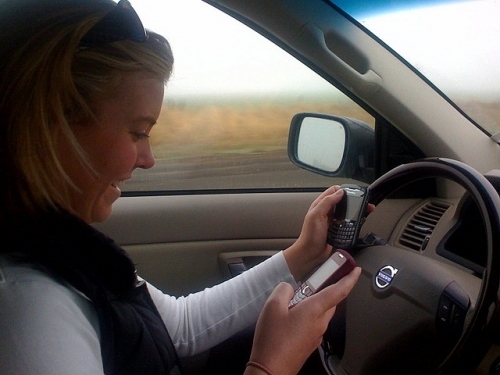
As regular drivers, we often take for granted the high level of concentration and ability that driving demands. Motorists who allow their attention to wander are putting themselves and others at serious risk.
In the North-East alone, there were 1,904 collisions involving drivers or riders who were not paying attention to the road from 2005 to 2012, according to the North East Regional Road Safety Resource. You certainly don’t want to be landed with any charges, as aside from being extremely dangerous, lapses of concentration can also make your insurance premiums soar and you could even have your licence revoked or be sentenced to time in prison depending on the severity of the accident.
Distracted drivers could be charged with a range of offences, such as Dangerous Driving, Careless and Inconsiderate Driving, Failure to Be In Proper Control of the Vehicle, or Driving Without Due Care and Attention.
Don’t take the risk, familiarise yourself with the most common driving distractions and learn how you can avoid them.
Texting
Texting requires cognitive, visual and manual attention from the driver, which makes it by far the most dangerous distraction while driving.
Although there have been many attempts to prevent texting while on the road, some still can’t tear ourselves away, with 20% of teenagers and 10% of parents admitting that they have been involved in multi-message text conversations while driving, a study by the Transportation Research Institute revealed. Dying to answer a text you’ve seen flash up on your phone? Put it out of sight while you are driving to avoid the temptation of checking those texts.
Eating and drinking
Don't let a bag of crisps rocket your insurance premium. Taking your hands off the wheel by constantly dipping in and out of a food packet and looking elsewhere is enough of a distraction to cause an accident.
Pull over if you need to have a bite to eat or a drink just in case, this also avoids any unnecessary spillages which could further coax your attention away from driving.
Phone calls - Manual and hands-free
Handheld phone conversations are naturally more dangerous than hands-free, as you are removing your hand from the steering wheel. Although it was made illegal to use a handheld phone while driving a vehicle in the UK, people still succumb to answering their phone. You’re risking an on-the-spot £100 fine and 3 penalty points on your license if caught, along with a potential court hearing, disqualification from driving and a £1,000 maximum fine in certain cases.
You may be fooled into believing that talking on a hands-free phone is safe because it is still legal in the UK and is similar to speaking to passengers in the car with you. However, an American study found that drivers on hands-free phones have much slower reaction times and poor speed control, yet drivers with chatty passengers perform nearly as safely as drivers with silent passengers, clearly demonstrating that hands-free kits are much more distracting.
Using hands-free in the car could even be more dangerous than drink driving. Driver reaction times are also 30% slower while using a hands-free phone than driving with a blood alcohol level of 80mg alcohol per 100ml blood (the current UK limit), and nearly 50% slower than driving under normal conditions, according to a study by the Transport Research Laboratory.
Personal grooming
There might be a reason why vanity is a sin, looking in the mirror, putting makeup on and styling your hair means that your eyes are temporarily taken off the road.
Even a few seconds of distraction are enough to cause an accident. A survey by VTTI found that you could travel the same distance as the length of a football pitch in 5 seconds if you were driving at 55 mph, imagine doing that blindfolded!
Smoking
Locating and lighting a cigarette can cause a manual distraction to the driver. Once lit the smoke may cloud the vision of the driver and if accidentally dropped on to their lap, the burning cigarette will cause an even greater distraction.
Reading
Taking your attention away from the road will always be dangerous due to the interruption of concentration it creates. Reading in any form, including maps and texts, should be avoided to steer away from accidents.
Using a Sat nav
While Sat navs are a lot safer than using a handheld map or a visual display, they can still interfere with the driver’s concentration. Configure your machine before you start driving and never try and adjust it while moving, otherwise you may find yourself recalculating more than just your direction.
In-vehicle technology
Car insurance consultants are inundated with questions about in-vehicle technology these days. Many modern cars have in-built technologies that are aimed to make it easier to control aspects of the vehicle, such as voice command for operating the radio, making phone calls via hands-free and other speech controls.
While these technologies are aimed at making our lives easier, they can often go wrong and cause even greater distraction. You only have to think about how difficult it is to get your voice-activated car phone to call the right person to imagine what a nuisance composing an entire text would be.
Adjusting the music
There’s nothing better than listening to your favourite songs while you’re driving, but constant music flicking can hinder your concentration and drive you to distraction. Don’t be tempted to keep searching for a new station as you drive along, even if you have buttons on your steering wheel. Keep your focus on the road ahead.
Hopefully this information will make some people drive a little bit more conscientiously. While your insurance will cover you against most accidents, you certainly don’t want to be the one to cause an accident because you were texting or looking in the mirror.
Comments
Go to blog index
